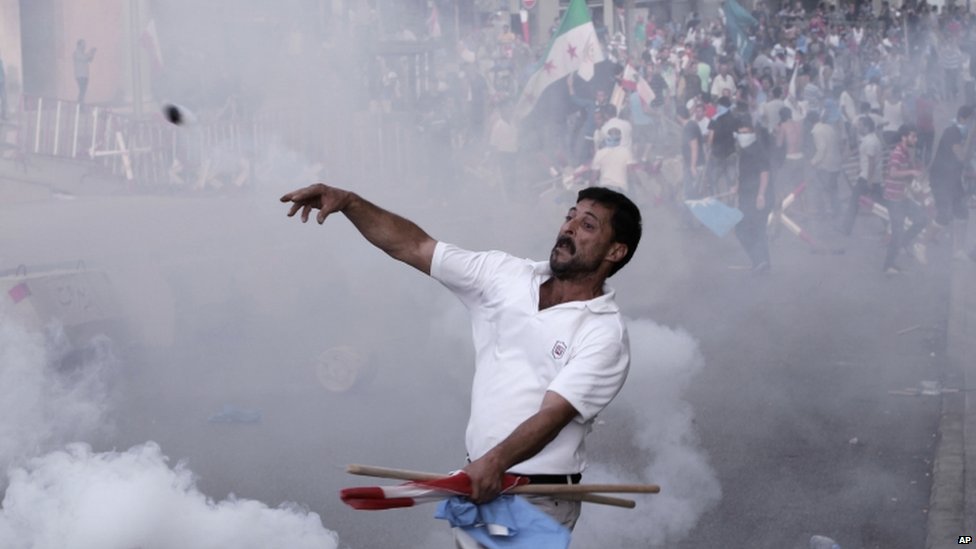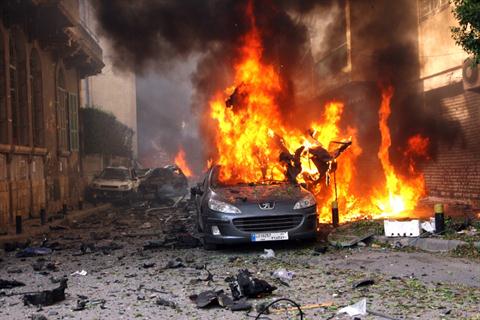By Emily Schneider
Impunity Watch Reporter, Middle East
BEIRUT, Lebanon – After the funeral of Brig. Gen. Wissam al-Hassan this Sunday, a throng of protesters took to the streets of Beirut to demonstrate their anti-government rage. Police fired warning shots and tear gas into the crowd, but dozens of dissidents rushed towards police lines as the mob circled the Prime Minister’s office.

A large crowd gathered in Beirut’s center square after the funeral to listen to a series of political speeches. At the addresses’ conclusion, the assembled mass began a push towards the prime minster’s office. According to reports, people in the horde were hurling sticks and stones and carrying flags. Protesters chanted for the dismissal of Prime Minister Najib Mikati.
They believed that the Syrian government was responsible for the bomb that caused Hassan’s death. According to CNN, Mikati is a “billionaire supported by Syrian ally Hezbollah.” Although Syria condemned the blast immediately after it happened, many Lebanese remain skeptical about the neighboring regime’s role in the bombing. Some saw Hassan’s death as an assassination mirroring those that took place in 2005, when the assassinati0n of then-Prime Minister Rafik Hariri sparked the end of Syria’s occupation of Lebanon. His demise was soon followed by the deaths of several more high-level Lebanese officials, most of whom were known to have anti-Syrian sentiments.
Mikati offered to resign from his position on Saturday. But after President Michel Suleiman asked him to stay place for the good of the nation, he rescinded the offer.
“I have always respected and admired al-Hassan, who has done great things for Lebanon,” Mikati explained to reporters on Saturday. “To hold me personally responsible for the assassination is unfair.”
Other officials disagreed with him, including former Prime Minister Fouad Siniora. “This government is responsible for the assassination of [a] martyr [al-Hassan] and his companion martyrs, therefore, this government must leave,” Siniora told the crowd on Sunday.
A prominent opposition Minister of Parliament, Ahmad Fatfat, told the BBC’s Newshour programme that the possibility of the situation in Syria spilling into Lebanon is a real danger.
“What Mr. Assad is trying to do now is transfer his problem to all the countries around Syria – to Turkey, to Lebanon, to Iraq, to Jordan, and Lebanon is the most fragile in this story,” Fatfat said. “And maybe Assad will do what he can to transfer Lebanon into a hell situation so he can think later on that what is going on is a general war in the Middle East and not a revolution in Syria.”
Many attendees of Hassan’s funeral waved the light blue flag of the Sunni-based opposition Future Party, while others carried Lebanon’s national flag. These visible differences symbolized internal tensions that are mounting within the Lebanese public. Those allied with Sunni coalitions have been critical of what they believe is the Lebanese government’s closeness with the Syrian regime.
“We came for Lebanon’s future to show that we will not be scared,” said one of the mourners.
For further information, please see:
Al-Arabiya – Angry Protestors Storm Lebanese Government HQ, Call for PM to Quit – 21 October 2012
BBC –Beirut funeral for Wissam al-Hassan Followed by Clashes– 21 October 2012
CNN – Violence Erupts After Lebanese Intelligence Chief’s Funeral – 21 October 2012
The Daily Star – Calm Returns After Police, Protestors Clash in Beirut – 21 October 2012
The Daily Star – Siniora Demands Cabinet Resign at Hassan’s Funeral – 21 October 2012


